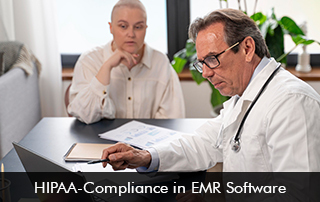It has become even more crucial to protect patient data as cyber-attacks have surged in recent years. This has made patient data stored in EMR Software vulnerable and put immense stress on healthcare organizations as these attacks can cost billions of dollars. To ensure data security around the clock and meet regulatory standards Electronic Medical Records Software technology should be HIPAA-compliant.
What is HIPAA compliance?
HIPAA compliance refers to following the requirements established by the Health Insurance Portability and Accountability Act (HIPAA) of 1996 in the United States. This act creates national standards for protecting individuals’ medical records and other personal health information (PHI). Organizations that handle PHI must take certain steps to safeguard the confidentiality, integrity, and security of sensitive information.
The Importance of HIPAA-Compliance in EHR Software
Guarding Sensitive Patient Data
Electronic Health Records (EHR) Software stores a wealth of patient data which can empower providers to offer comprehensive and high-quality patient care. The EMR System stores personal patient data, medical history, test results, treatment plans, procedures, and legal and consent documents. HIPAA-compliant software technology ensures that this information is protected from hackers. Strict controls on who can access and distribute this information are mandated by HIPAA compliance, protecting patient privacy.
Building Patient Trust
When a patient knows that the EHR Software used has robust security protocols with HIPAA-Compliance they are more likely to share their sensitive patient history candidly. This can help build a stronger relationship between the provider and the patient. Since patients know that the information is protected they won’t hold back in sharing sensitive information.
Technical Security Standards
Compliance guarantees that the electronic medical records software has the required technological protections. This includes secure user authentication, encryption, and audit measures to keep an eye on PHI usage and access.
Meeting Regulatory Compliance
For healthcare providers in the USA, it is mandatory to use an EMR Software System that is HIPAA-compliant to meet regulatory compliance. If the system is not certified and does not comply with HIPAA laws then the practitioner can lose their license to practice.
Interoperability with EMR Software
Compliant EHR software must adhere to HIPAA data exchange rules. In keeping with security and privacy, this encourages interoperability across various healthcare systems, enabling improved care coordination and information sharing.
Moreover, HIPAA-compliant software guarantees the security and compliance of data transferred between different organizations (such as laboratories, primary care physicians, and specialists). This can facilitate care coordination, close any gaps in care, and enhance the delivery of healthcare overall.
Quick Guidelines for Enhanced HIPAA-compliance with Your EHR Software
The following security tips can make your system better with HIPAA compliance and ensure that any cyber-attacks and threats are kept at bay.
- Train and educate employees on the value of HIPAA compliance.
- Safeguard data by logging out properly.
- Use access controls.
- Backup your data regularly on a cloud server.







